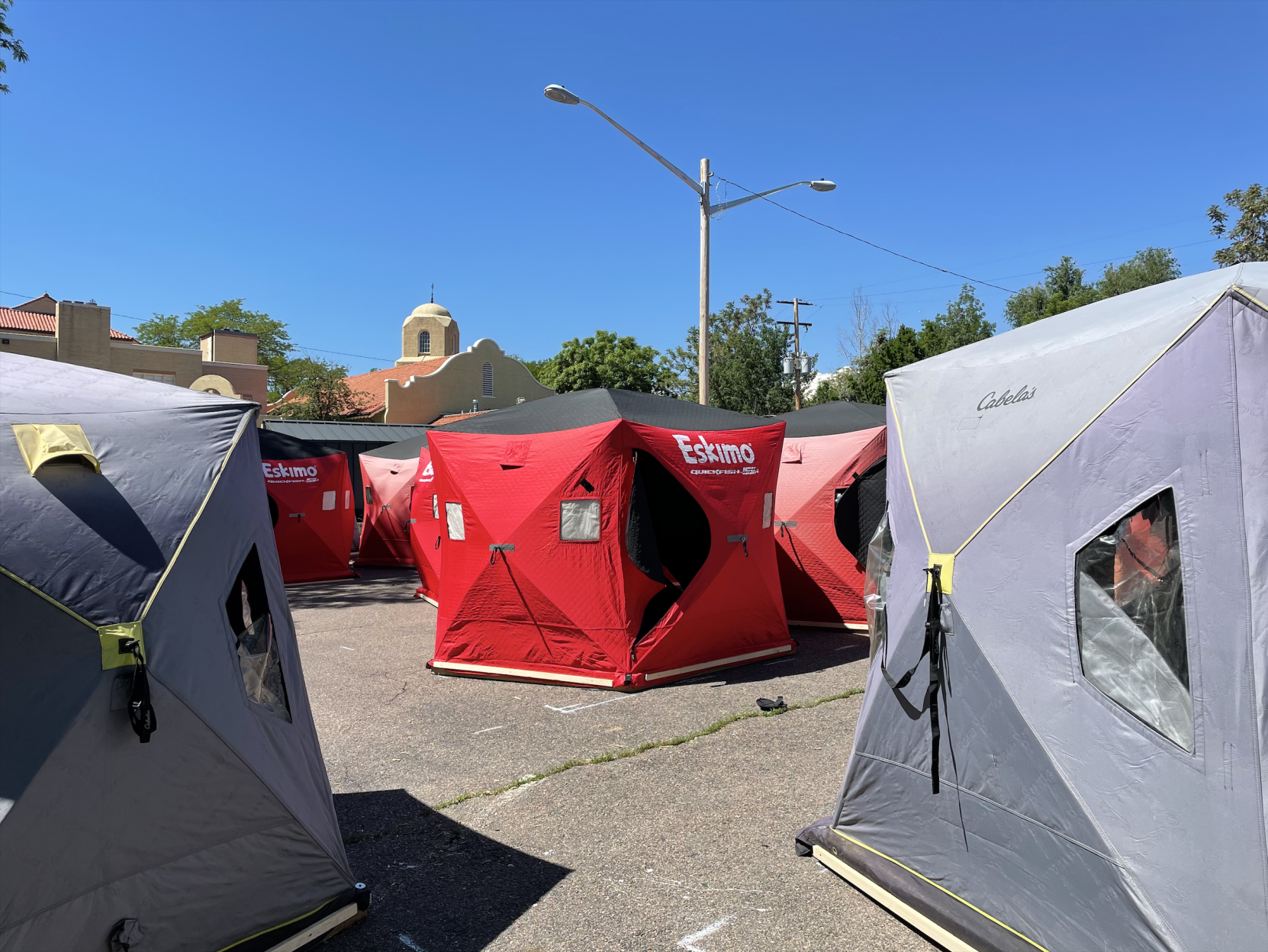Board strikes down effort to reverse zoning permit for Park Hill managed homeless camp
The Denver Board of Zoning Appeals narrowly rejected an effort to reverse the zoning permit for the managed homeless campsite at Park Hill United Methodist Church.
During the board meeting Tuesday, three of the five board members voted to reverse the zoning permit; however, the action required a four-vote supermajority to pass. With two board members voting against the reversal, the effort failed.
Those advocating for the permit reversal argued that the zoning administrator who issued the campsite’s permit did not adequately consider the impacts on the surrounding community. Specifically, the appellants raised issue with the campsite’s policy on drugs.
The Colorado Village Collaborative, which runs the campsite, does not allow drugs or alcohol within the camps; though, staff do not search residents or their belongings for such things.
“It was the multistep resident accountability process that I struggle with in regard to their drug policy,” said Board Member Jim Keavney, who voted in support of the reversal. “The CVC drug policy violates state and federal law with regard to drugs in proximity to schools and daycares.”
Report: Almost half a billion dollars spent on homeless services in Denver metro region
“I have concerns about health and safety as well. I think there should be more rule-making around it, but that’s not our job,” said Board Member Charlie Young, who voted against the reversal.
Young said his deciding vote was based on the Denver Zoning Code, saying he couldn’t find anything in it that requires zoning administrators to consider health and safety when issuing a zoning permit for a specific campsite.
Denver’s fourth managed homeless campsite, also called a Safe Outdoor Space, opened at the Park Hill United Methodist Church in June.
The campsite at 5209 Montview Blvd. is intended to house up to 40 residents until Dec. 31, providing them with heated tents, food donations, dental care, food stamps, COVID-19 testing, community service opportunities and services for permanent housing.
This newest site, in addition to a location at Regis University, replaced the first two Safe Outdoor Spaces that opened in December to address Denver’s rising homeless population and increasing public health risk during the COVID-19 pandemic.
In 2020, there were 6,104 homeless residents in the Denver metro area, according to an annual count. Of those homeless residents, 1,561 were unsheltered.
Denver seeks public feedback on five-year plan to address homelessness
“(Park Hill is) a living example that demonstrates the reality that unsheltered homelessness could be a thing of the past,” said Cole Chandler, executive director of Colorado Village Collaborative. “By working together, we can advance life changing solutions to the housing and homelessness crisis that deliver safety, dignity and hope for the most vulnerable among us.”
Tuesday’s appeal effort is the latest of several attempts from some residents of the surrounding community to shut down or prevent the Park Hill camp.
After the Safe Outdoor Space was announced, a small group of neighbors sued the church, pastor, city and Colorado Village Collaborative for a restraining order to stop the campsite. The lawsuit, which was thrown out by a judge in May citing lack of jurisdiction, claimed the campsite would create a nuisance and present a danger to the community.
Chandler has fought this claim, saying the campsites reduce the neighborhood impact of unsanctioned camps by taking in people already living in illegal camps. The Denver Police Department has also reported no uptick in safety issues in areas surrounding the campsites, according to Police Chief Paul Pazen.
The campsites are fenced off and staffed around the clock, according to Colorado Village Collaborative. Camp residents are screened to keep out all sex offenders and those convicted of violent crimes within the last five years. Despite this, community concerns remain.
Denver metro leaders celebrate economic recovery, set sights on homelessness in State of the City
“The fact that all board members agreed that (the zoning administrator) failed to ensure the protection of health and safety for all is a win and should have been the end of the story,” said Sarah Baker, counsel for some of the appellants.
With Tuesday’s failed appeal, Denver’s managed homeless campsites are likely to stick around for a while.
During the State of the City address last month, Mayor Michael Hancock committed to increasing the number of Safe Outdoor Spaces in the city, in addition to tiny home villages, safe parking spaces and other sheltering options.
Many residents use the camps to transition into more stable housing, data show. On May 13, the Colorado Village Collaborative reported five people had moved into tiny homes, two into permanent homes, five were on housing vouchers that can be spent on rented housing and 12 had gotten jobs or were looking for jobs.
The campsites have also provided 180 case management appointments to help residents address past legal issues that prevent them from obtaining housing and employment, according to Colorado Village Collaborative.





